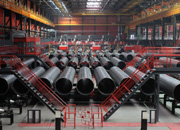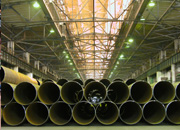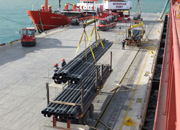Home - News > Industry NewsIndustry News
Installation requirements for threaded insulating joints for oil casing
Update:2024-12-30 View(s):664 Keywords :oil casing, installation oil casing, oil casing threaded
1. Avoid dead ends within 50 meters of the insulating joint installation.
2. After the insulating joint is connected to the pipeline, the pipeline is not allowed to be lifted within 5 meters of the joint. It must be pressure tested together with the pipeline.
3. After the insulating joint is connected to the pipeline, the joint should be patched as required, and the surface temperature of the insulating joint must not be higher than 120℃ during anti-corrosion operations.
4. When installing the insulating joint, it should be installed on both ends of the joint on the straight pipe section 20 meters away from the elbow and a bracket should be set. When buried, it should be avoided to install it in a place with perennial water accumulation.
5. The center axis distance of the joint should be installed on the same straight line as the center axis distance of the pipeline, and the center axis distance of the two joints should not be greater than 0.2mm during installation.
6 When the pipeline displacement is ≥ the compensation amount of the insulating joint, the number of joints should be increased to parallel the displacement. It is strictly forbidden to adjust the pipeline tolerance to make the insulating joint within the limit of disturbing displacement and deviation, and it is not allowed to exceed the limit (expansion, displacement, deflection, etc.).
7 When the insulating joint is at a high level or suspended in the air, the pipeline should be fixed on a hanger, bracket, or anchor frame, and the insulating joint should not be allowed to bear the weight and axial force of the pipeline itself. Otherwise, the joint should be equipped with an anti-pull-off device (its bearing force must be greater than the axial force of the pipeline).
 Threeway Steel is known as a professional supplier engaged in manufacturing and distributing a wide range of steel pipe, and our headquarter located the central part of China – Hunan and six associated factories throughout China.
Threeway Steel is known as a professional supplier engaged in manufacturing and distributing a wide range of steel pipe, and our headquarter located the central part of China – Hunan and six associated factories throughout China.
 Threeway Steel is known as a professional supplier engaged in designing, manufacturing and distribution of a wide range of steel products with the headquarter located the central part of China – Hunan and six associated factories throughout China.
Threeway Steel is known as a professional supplier engaged in designing, manufacturing and distribution of a wide range of steel products with the headquarter located the central part of China – Hunan and six associated factories throughout China.
 Threeway Steel is known as a professional supplier engaged in designing, manufacturing and distribution of a wide range of steel products with the headquarter located the central part of China – Hunan and six associated factories throughout China.
Threeway Steel is known as a professional supplier engaged in designing, manufacturing and distribution of a wide range of steel products with the headquarter located the central part of China – Hunan and six associated factories throughout China.
 Threeway Steel is known as a professional supplier engaged in designing, manufacturing and distribution of a wide range of steel products with the headquarter located the central part of China – Hunan and six associated factories throughout China.
Threeway Steel is known as a professional supplier engaged in designing, manufacturing and distribution of a wide range of steel products with the headquarter located the central part of China – Hunan and six associated factories throughout China.
 Threeway Steel is known as a professional supplier engaged in designing, manufacturing and distribution of a wide range of steel products with the headquarter located the central part of China – Hunan and six associated factories throughout China.
Threeway Steel is known as a professional supplier engaged in designing, manufacturing and distribution of a wide range of steel products with the headquarter located the central part of China – Hunan and six associated factories throughout China.

